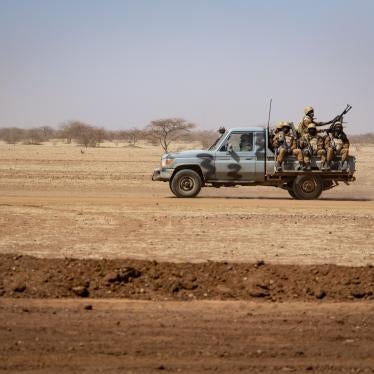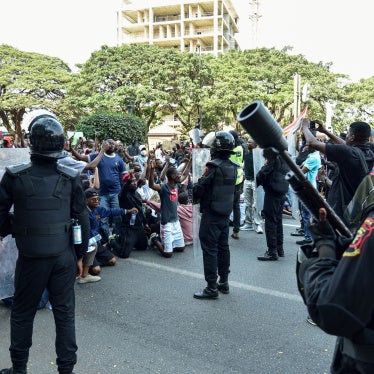Human Rights Watch today expressed alarm for the safety of civilians caught in the conflict in the Congo between forces loyal to President Laurent Kabila and ethnic Tutsi mutineers backed by neighboring Rwanda.
The organization also charged that longstanding ethnic injustice, together with President Kabila's increasingly harsh rule, led to the current crisis.
In Kinshasa, ethnic Tutsis, perceived as enemies of the state, are currently the targets of extensive search and arrest operations, according to Human Rights Watch sources. In eastern Congo, community leaders who recently denounced the presence of Rwandan troops in their region today find themselves in areas under the control of these very forces.
The failure to grant basic citizenship rights to the large Tutsi minority living in eastern Congo was one of the triggers for the Rwandan-led insurgency which overthrew dictator Mobutu Sese Seko in 1997. President Kabila disappointed his Rwandan backers, however, by failing to improve the status of ethnic Tutsis, leading to renewed strife in the east and tensions with Rwanda.
In addition, Kabila's rule became increasingly repressive. He banned political activities, closed human rights groups, had reporters beaten, and delayed a promised transition to democracy. He also obstructed a U.N. probe into massacres committed by his rebel troops and their Rwandan allies during his rise to power. "Kabila's denial of the fundamental rights of the Congolese and his monopolization of the political process have sapped the country of its strength," said Peter Takirambudde, Africa director of Human Rights Watch. "In the search for stability of the Congo, however, the international community, in particular the United States, was willing to excuse Kabila's exclusive governance and repressive practices."
"This sad turn of events is a clear demonstration that only accountability, pluralistic governance, and the rule of law, not political expediency, can bring stability in the Congo and the entire region," added Takirambudde.
Eyewitnesses reported to Human Rights Watch on Wednesday that government soldiers were arresting people of Tutsi origin at roadblocks in the capital Kinshasa and during door to door searches. Arrests occurred Wednesday at the Galérie Albert and Wagenia buildings in midtown Kinshasa. On Tuesday, government soldiers cordoned off l'Immeuble Royal, the building housing the office of the United Nations Development Program (UNDP) and seized two Tutsi families and a UNDP local employee. Reliable sources informed Human Rights Watch that dozens of frightened Congolese Tutsis went into hiding as a "witch hunt atmosphere" developed despite earlier government assertions that any attacks on foreigners and Tutsis would be severely punished.
Human Rights Watch is also gravely concerned about the safety of leaders of community organizations in South and North Kivu provinces who, because of their views on the rights of Congolese Tutsis and the role of Rwanda in the region might be perceived as hostile to Rwanda.
"We are also concerned about the fate of the Archbishop of Bukavu and the governor of South Kivu who were in Goma when the mutiny broke out and urge authorities in control of that city to guarantee their safety," said Takirambudde.
Human Rights Watch called on the international community to insist on full accountability for current as well as past human rights abuses in the Congo, Rwanda, and other countries in the Great Lakes region if a sustainable resolution to chronic instability in the region is ever to be found








